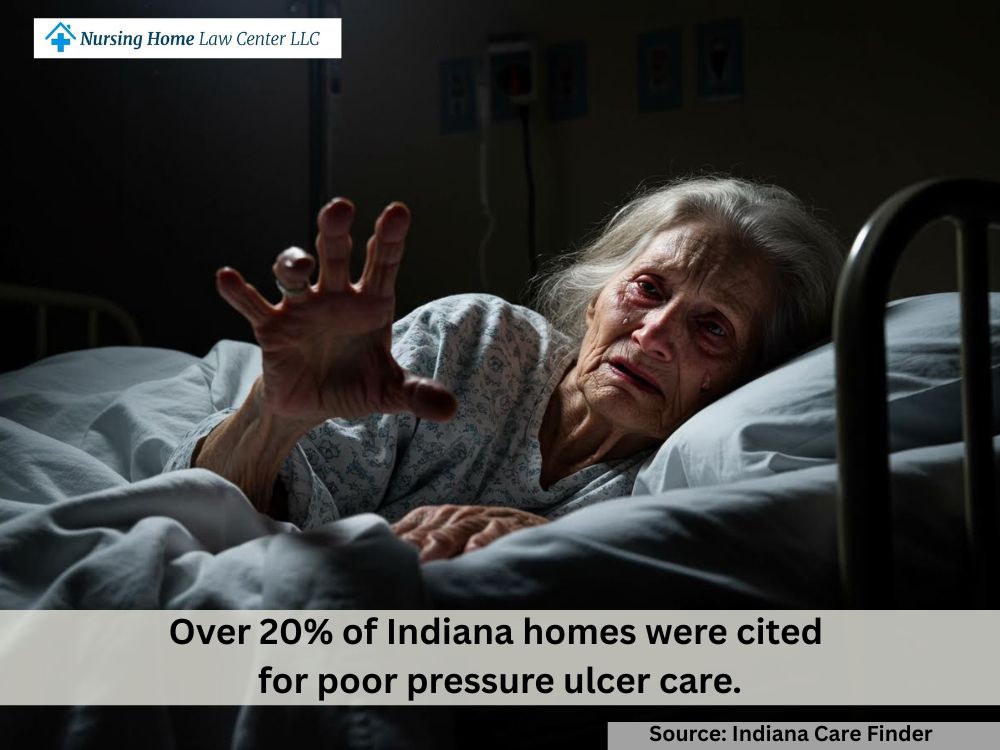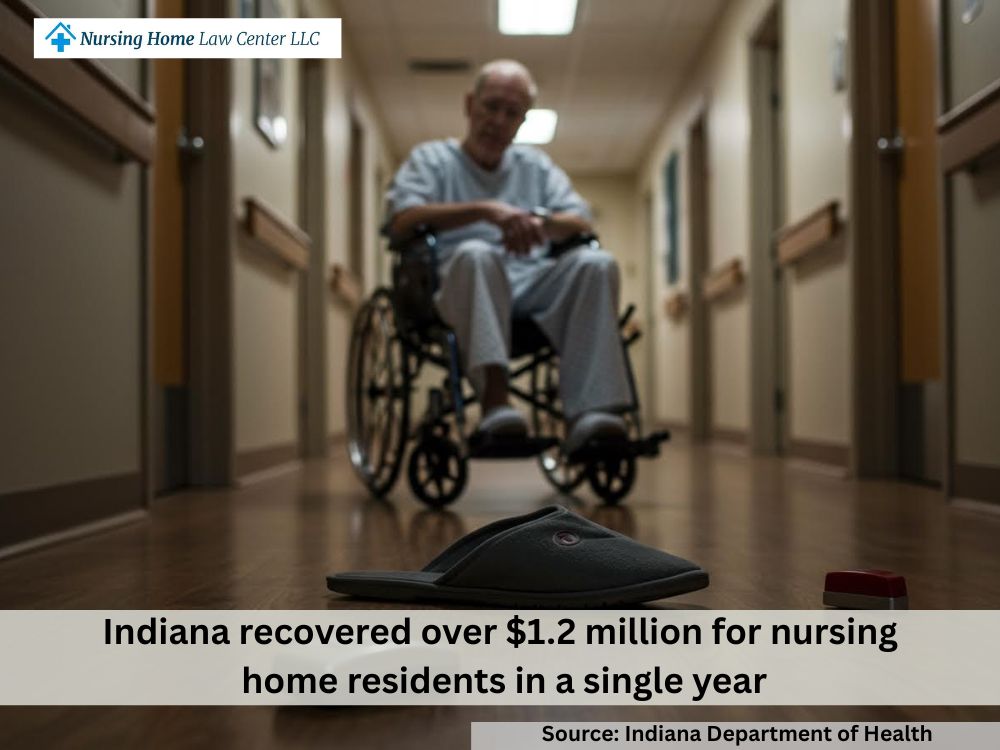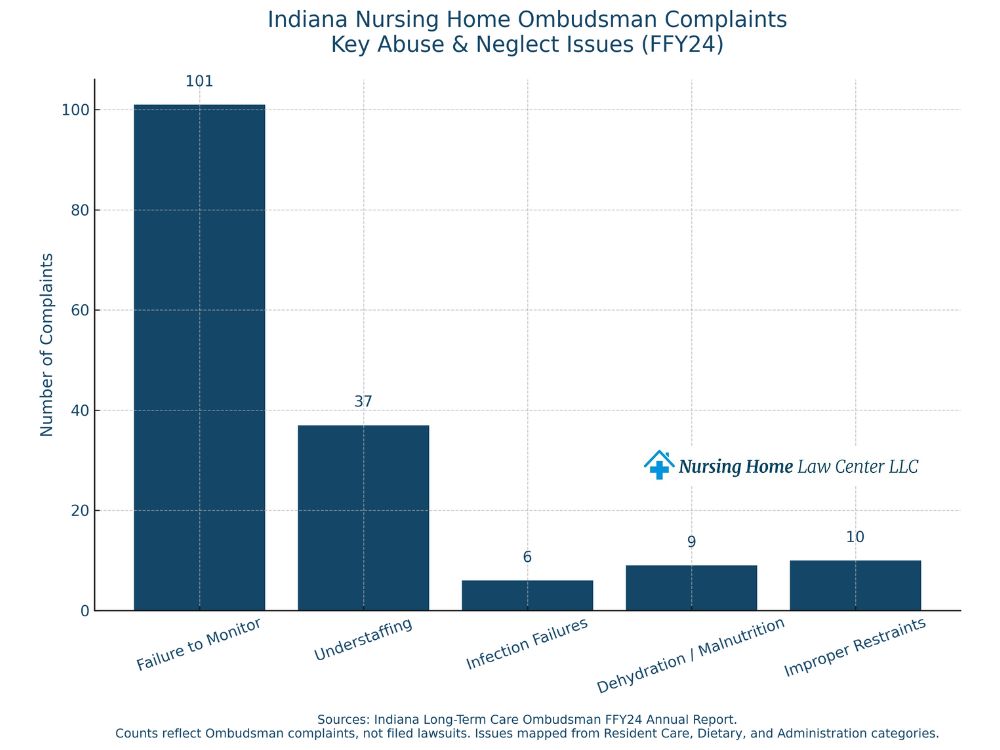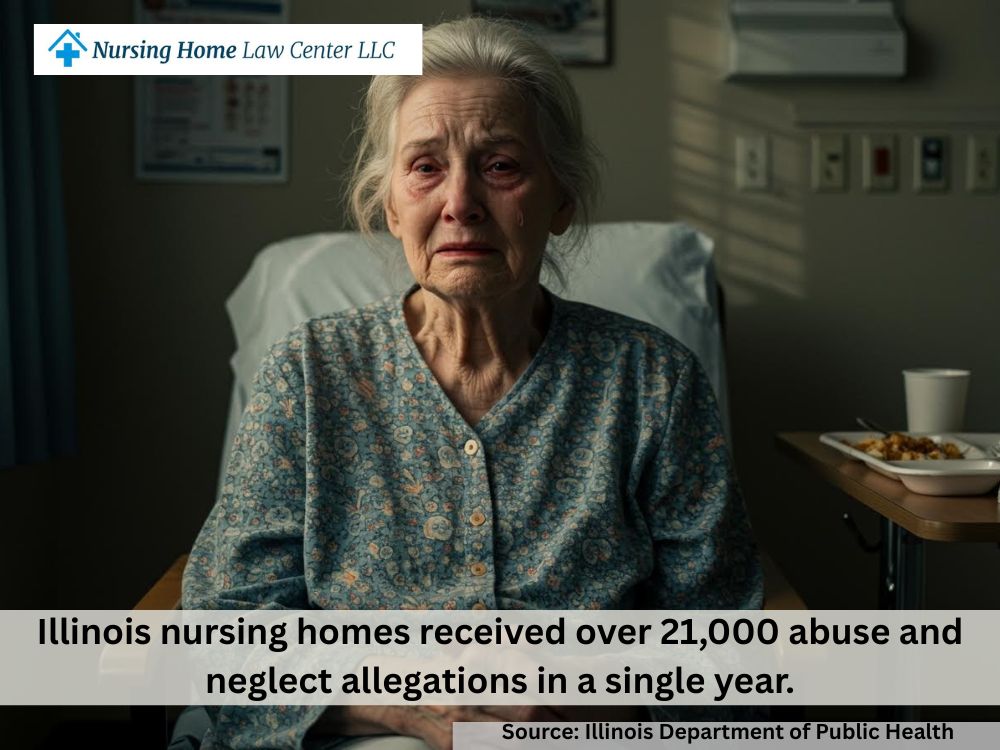The Nursing Home Law Center is committed to providing the legal resources necessary to hold negligent facilities accountable.
Indiana Nursing Home Abuse Lawsuit Settlements
If someone you love has suffered nursing home neglect in Indiana, you are not alone. Families across the state are taking a stand, and many are reaching fair Indiana nursing home abuse lawsuit settlements that help them move forward. At Nursing Home Law Center, our legal team is here to listen, support, and help you take the next step toward accountability.
No one should have to endure mistreatment in a nursing facility. Whether your case involves physical harm, emotional abuse, or wrongful death, we are here to help you understand your rights. We offer a free case review with no upfront costs, and we only move forward if you feel ready.

Nursing Home Settlement Amounts Recovered by Our Legal Team
Our Indiana nursing home abuse lawyers have extensive experience representing families in a wide range of nursing home abuse and neglect cases throughout the state.
$1,700,000 Settlement – Fall Leading to Fatal Brain Injury and Hip Fracture
Ruth, a 79-year-old nursing home patient in Evansville, suffered a fall after being left unattended near a wet hallway. She sustained a subdural hematoma and a fractured hip, leading to complications that required long-term hospitalization.
Our personal injury lawyers showed the facility had prior citations for unsafe walking conditions. The settlement reflected both the serious injuries and the home’s history of noncompliance with safety standards monitored by Indiana’s long-term care ombudsman program.
What Types of Damages Can Be Recovered Through Nursing Home Neglect Settlements?
When a nursing home resident is harmed by abuse or neglect, the resulting damage often goes beyond physical injuries. Nursing home neglect settlements can provide financial compensation for both immediate and long-term impacts. These cases aim to help families recover financial relief for medical care, emotional harm, and other related expenses.
Medical Expenses
Neglect often leads to serious medical issues like infections, fractures, or untreated wounds. Nursing home neglect settlements may cover hospital stays, surgeries, rehabilitation, and follow-up treatment. These costs can add up quickly, especially when long-term care is needed. Compensation also helps with future medical needs linked to the neglect.
Emotional Distress
Nursing home abuse victims frequently suffer from anxiety, depression, fear, or post-traumatic stress. Emotional distress damages are often included in nursing home abuse settlements, especially when the trauma was prolonged or severe. These damages acknowledge the non-physical harm a resident has endured and the emotional toll on family.
Relocation Costs
When a facility fails to provide safe care, families often have no choice but to move their loved one to a new nursing home. Relocation can involve added expenses, including transportation, new admissions, and setup fees. Nursing home lawsuit settlements may include compensation for these costs, along with the disruption they cause.

What Is the Largest Nursing Home Settlement in Indiana?
The average nursing home abuse settlement is approximately $4.5 million, while the median settlement is $825,000. This wide gap suggests that a few exceptionally high-value cases–such as class actions or those involving extensive, documented harm–have raised the overall average.
Settlement values range from as low as $10,000 to as high as $160,050,000, reflecting the broad spectrum of case severity, facility liability, and long-term impact on victims and their families.
Several key factors influence nursing home settlement amounts:
- Severity of harm: Settlements tend to be higher when the victim suffers serious injuries, long-term complications, or death. Cases involving permanent disability, untreated infections, or repeated neglect often result in larger payouts.
- Type of abuse or neglect: Physical abuse, sexual assault, medical malpractice, and nursing home negligence are taken especially seriously. Psychological abuse or financial exploitation may also result in compensation, though amounts vary depending on the evidence and impact.
- Facility’s history and violations: Nursing homes with a record of safety violations, poor inspections, or prior lawsuits may face increased liability. This can raise settlement amounts, especially if the facility ignored known risks.
- Evidence and documentation: Strong proof–such as medical records, photos, witness statements, and staff reports–can make a case more compelling and increase its value.
- Economic damages: Medical bills, funeral expenses, and out-of-pocket costs related to the abuse are factored into the total settlement.
- Pain and suffering: Emotional trauma, loss of dignity, and the psychological impact on both the victim and their family can significantly influence the final amount, especially in wrongful death cases.
- Age and health of the victim: Courts may consider life expectancy and existing health conditions, which can affect both economic losses and how non-economic damages are evaluated.
Each case is different, and the settlement reflects the specific details surrounding the abuse, the harm caused, and the facility’s level of responsibility.
Example Nursing Home Negligence Settlements and Verdicts
$114 Million Verdict for Elderly Woman’s Fatal Neglect
Juanita Jackson, a 76-year-old mother of four, was admitted to a nursing home for short-term rehabilitation. Despite staff knowing she was at high risk for falls, no proper precautions were taken. Within two weeks, Jackson fell and suffered a head injury and a fractured upper arm. Over time, her condition worsened significantly.
Her family alleged that she was not properly fed or hydrated, was overmedicated, developed multiple pressure sores—including at least one Stage IV sore with tissue and bone damage—and was left in bed so long that she developed severe contractures. Jackson’s health rapidly declined after being removed from the facility, and she died just over a month later.
Her estate sued multiple related companies for nursing home wrongful death and negligence. The jury found the defendants each 50 percent responsible and awarded a total of $114 million, which included $5 million for pain and suffering, $100 million in punitive damages, $5 million for wrongful death, and $4 million for loss of parental guidance.
$82 Million Nursing Home Lawsuit Settlement After Fatal Neglect
Robert Ernst, age 53, entered a nursing home following a severe stroke that left him paralyzed on one side and dependent on a feeding tube. While in care, Ernst became severely dehydrated and malnourished and developed extreme contractures that left him unable to turn in bed.
As a result, he developed 14 pressure sores, seven of which were Stage IV. Some of the infections reached the bone, and surgery was required to remove infected tissue. His condition deteriorated, and he died several months later.
His estate sued the facility and its administrator, claiming gross negligence and poor care caused by chronic understaffing. A jury awarded $82 million in damages, including $7 million in compensatory damages and $75 million in punitive damages. However, the actual payout was reduced to $20 million based on a high-low agreement reached during the trial.
$54 Million Award in Case Involving Untreated Internal Bleeding
Barbara Barber, 78, had a range of chronic health issues and was on a blood thinner to manage her condition. Her daughter claimed that the nursing home failed to recognize signs of internal bleeding and did not take appropriate action to treat it. She alleged that this failure led directly to Barber’s death. The defense argued that Barber died of a heart attack and maintained that the facility provided proper care.
A jury sided with the plaintiff and awarded a total of $54 million, which included $50 million in punitive damages and $4 million in compensatory damages. The case highlighted allegations of neglect related to medication management and failure to respond to medical emergencies.

What Are Common Grounds for Nursing Home Abuse or Neglect Lawsuits?
When a loved one is harmed in a nursing home, families often have legal grounds to take action. Abuse and neglect can take many forms, some visible, others harder to detect. Understanding the most common causes of legal action can help families know what to look for and when it’s time to speak with an experienced attorney about filing a nursing home abuse lawsuit.
Physical Abuse
Physical abuse in a nursing home can include hitting, slapping, shoving, or improper use of physical restraints. It often results in visible injuries like bruises, fractures, or cuts. In many cases, residents may be too afraid or unable to report what happened. Family members may notice sudden changes in behavior, unexplained injuries, or hospital visits.
Lawsuits involving physical abuse aim to hold facilities accountable for failing to protect residents from harm by staff members or other residents. These claims often include damages for medical expenses, pain and suffering, and emotional distress.
Emotional Abuse
Emotional abuse may not leave physical marks, but it can cause lasting psychological harm. This type of abuse includes threats, humiliation, isolation, or verbal harassment by nursing home staff members. Residents may become withdrawn, anxious, or depressed, especially if the abuse is ongoing.
Because psychological abuse is harder to detect, it’s often overlooked until a resident’s mental health sharply declines. Legal claims in these cases can seek nursing home compensation for emotional trauma and the impact on quality of life. Nursing home litigation can also push facilities to enforce stricter oversight and staff training.
Financial Abuse
Elderly nursing home residents are frequent targets of financial exploitation. Staff, caregivers, or even other residents may steal cash, pressure residents into altering wills, or misuse credit cards and bank accounts. In some cases, residents are coerced into giving away personal property or making unauthorized financial transactions.
These abuses often go unnoticed until family members review account statements or legal documents. Lawsuits involving financial abuse aim to recover stolen assets and hold the facility accountable for failing to monitor or report suspicious behavior. The nursing home may also face penalties under Indiana state laws.
Sexual Abuse
Sexual abuse in nursing homes is a deeply traumatic violation that can involve unwanted touching, forced nudity, or assault. Victims may be particularly vulnerable due to cognitive decline or physical limitations, making it harder for them to report the abuse. Warning signs can include bruising, fearfulness around certain staff members, or sudden changes in behavior.
Sexual abuse claims often lead to significant nursing home lawsuit settlements due to the severe emotional and physical pain involved. These cases also highlight serious failures in hiring, supervision, and reporting protocols within the nursing facility.
Neglect
Neglect occurs when a nursing home fails to provide the basic care a resident needs–such as help with hygiene, nutrition, mobility, or medical treatment. Common signs include bedsores, dehydration, weight loss, infections, and poor personal hygiene. Unlike abuse, which is intentional, neglect often stems from understaffing, inadequate training, or lack of oversight.
Families may file a nursing home neglect case if their loved one suffers harm as a result. Settlements in these cases may cover medical bills, long-term care needs, and psychological trauma caused by prolonged neglect.
Wrongful Death
When a resident dies due to elder abuse or neglect, surviving family members can file a nursing home wrongful death lawsuit. These cases often involve issues like untreated infections, falls, malnutrition, or medical errors that could have been prevented with proper care.
Wrongful death claims seek compensation for funeral costs, loss of companionship, and other damages related to the death. They also bring attention to systemic problems within the facility. Indiana law allows the resident’s estate or family members to pursue these claims through civil litigation.
What Indiana Laws Regulate Nursing Home Abuse Settlements?
In Indiana, most nursing home abuse cases must be filed within two years from the date the injury occurred or was discovered (§ 34-11-2-4). This deadline applies to personal injury lawsuits related to abuse, neglect, or medical errors in a nursing home.
If the victim is mentally incapacitated, or if the abuse was not immediately apparent, certain exceptions may apply, but it’s best to consult an experienced nursing home abuse attorney as early as possible.
When a resident dies due to elder abuse or neglect, surviving family members may bring a nursing home wrongful death case under § 34-23-1-2 of the Indiana Code. This allows the victim’s estate to recover damages, including funeral costs, medical bills, and compensation for the loss of love and companionship.
Several state and federal agencies play a role in investigating nursing home abuse cases, monitoring facility conditions, and enforcing compliance:
- Indiana State Department of Health (ISDH) – Conducts routine inspections and investigates complaints in licensed nursing homes.
- Adult Protective Services (APS) – Responds to reports of abuse, neglect, or exploitation of endangered adults, including those in assisted living facilities or nursing homes.
- Long-Term Care Ombudsman Program – Advocates for residents in nursing homes and long-term care facilities, helps families file complaints, and monitors facility practices.
- Centers for Medicare & Medicaid Services (CMS) – Regulates federally funded nursing homes and tracks performance, penalties, and health inspection data.
These agencies not only help identify violations but can also provide valuable documentation during legal proceedings. Inspection reports, complaint histories, and regulatory findings often serve as key evidence in nursing home negligence settlements.

How to File a Nursing Home Lawsuit in Indiana
Filing a nursing home abuse lawsuit in Indiana starts with a free case review, giving families a chance to share what happened and learn whether legal action is an option.
If the case moves forward, your nursing home abuse lawyer will begin gathering medical records, facility documents, witness statements, and reports from oversight agencies like the Indiana State Department of Health or Adult Protective Services.
After reviewing the evidence, your personal injury attorney will file a complaint in civil court. This document outlines the abuse or neglect, the responsible parties, and the financial compensation being sought.
Once the case is filed, both sides exchange information through discovery. Our personal injury attorneys uncover safety violations, poor staffing, or ignored complaints that contributed to your loved one’s injuries. These details often influence nursing home settlement amounts and may lead to a resolution without going to trial.
Many nursing home abuse cases are resolved through negotiations with insurance companies. If a fair settlement isn’t offered, your nursing home abuse lawyer will be ready to take the case to trial. Whether resolved in or out of court, our legal team will handle every step of the legal process, including final paperwork and disbursement of the nursing home abuse compensation you recover.
Understand Your Options to Recover a Nursing Home Lawsuit Settlement
If your loved one has suffered nursing home abuse or neglect, you don’t have to face the aftermath alone. At Nursing Home Law Center, we believe in your case and the importance of being heard. Our trusted legal partners help families nationwide recover the financial support they need to help them heal from nursing home abuse.
We offer a free consultation, and if you choose to move forward, you won’t pay anything unless we recover compensation for you.
Our experienced nursing home abuse lawyers are ready to stand with you every step of the way as you take action towards seeking justice and accountability. Contact us today at (800) 926-7565 for a free, no-obligation case review and explore your legal options with no financial risk.
| Indiana Nursing Home Abuse Lawsuit Settlements | ||
| Northern Indiana | Central Indiana | Southern Indiana |
| Fort Wayne | Indianapolis | Evansville |
| South Bend | Carmel | Bloomington |
| Gary | Fishers | New Albany |
| Hammond | Noblesville | Jeffersonville |
| Elkhart | Greenwood | Columbus |
| Mishawaka | Anderson | Terre Haute |
| Valparaiso | Muncie | Clarksville |
| Goshen | Kokomo | Jasper |
| La Porte | Plainfield | Bedford |
| Michigan City | Westfield | Vincennes |

